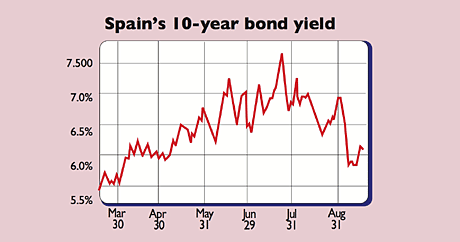Get the latest financial news, insights and expert analysis from our award-winning MoneyWeek team, to help you understand what really matters when it comes to your finances.
You are now subscribed
Your newsletter sign-up was successful
Want to add more newsletters?

Twice daily
MoneyWeek
Get the latest financial news, insights and expert analysis from our award-winning MoneyWeek team, to help you understand what really matters when it comes to your finances.

Four times a week
Look After My Bills
Sign up to our free money-saving newsletter, filled with the latest news and expert advice to help you find the best tips and deals for managing your bills. Start saving today!
Eurozone policymakers have had a good few weeks for once. European Central Bank (ECB) president Mario Draghi impressed markets with his bond-buying programme. Germany's constitutional court approved the eurozone's permanent rescue fund. And Dutch voters turned away from eurosceptic parties in their general election.
But it is dawning on initially euphoric investors that while the "tail-risk of sovereign defaults in Italy and Spain" should now be "off the table", as Ambrose Evans-Pritchard puts it in The Daily Telegraph, the ECB plan is a palliative rather than a cure. A series of problems, both old and new, remain. That's why the yield on Spanish ten-year government debt has begun to climb again as prices have fallen.
The ECB's bond-buying programme can only be activated if Spain asks for help. So far it hasn't, because the prime minister, Mariano Rajoy, "continues to pretend" it doesn't need it, says The Economist. He isn't fooling anyone. The "economic mess" is getting worse and requires "an emergency infusion".
MoneyWeek
Subscribe to MoneyWeek today and get your first six magazine issues absolutely FREE

Sign up to Money Morning
Don't miss the latest investment and personal finances news, market analysis, plus money-saving tips with our free twice-daily newsletter
Don't miss the latest investment and personal finances news, market analysis, plus money-saving tips with our free twice-daily newsletter
Rajoy also fears the political cost of asking for help as the bond-buying comes with strict conditions. Rajoy will presumably be persuaded to sign up rather than risk Spanish yields hurtling back to unsustainable levels that would threaten a default and a meltdown.

But once Spain, or another state, signs up,there's a further potential problem. How will the ECB ensure that a country lives up to the conditions attached to the bond-buying? In theory, the ECB will stop its bond-buying if a country backslides. But that would threaten a messy default and the end of the euro, so it's unlikely. "There surely must be an incentive for electorates and their elected representatives to call Mr Draghi's bluff," says Wolfgang Munchau in the Financial Times.
That suggests the politics of euro rescue will become increasingly toxic, with north pitted against south, as Mario Monti, Italy's prime minister, worries. The north is likely to become resentful of southern countries trying to water down their rescue terms, and become loath to send more money to the periphery, especially as the deepening continental downturn leaves it with less money.
Spain and Italy are "already in debt-deflation spirals" yet are set to face "Carthaginian terms" for ECB bond-buying, says Evans-Pritchard in The Daily Telegraph. Europe's "political minefield", which could ultimately also cause a euro break-up, "lies ahead".
Get the latest financial news, insights and expert analysis from our award-winning MoneyWeek team, to help you understand what really matters when it comes to your finances.
MoneyWeek is written by a team of experienced and award-winning journalists, plus expert columnists. As well as daily digital news and features, MoneyWeek also publishes a weekly magazine, covering investing and personal finance. From share tips, pensions, gold to practical investment tips - we provide a round-up to help you make money and keep it.
-
 Should you buy an active ETF?
Should you buy an active ETF?ETFs are often mischaracterised as passive products, but they can be a convenient way to add active management to your portfolio
-
 Power up your pension before 5 April – easy ways to save before the tax year end
Power up your pension before 5 April – easy ways to save before the tax year endWith the end of the tax year looming, pension savers currently have a window to review and maximise what’s going into their retirement funds – we look at how

